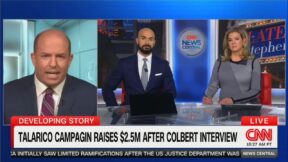Scott Galloway Warns Stock Market Is a ‘Late-Stage Bubble’: ‘America Right Now is a Giant Bet On AI’
Scott Galloway and Kara Swisher discussed widespread concerns of an AI bubble larger than the dot-com bubble or the subprime mortgage crisis tanking the markets during the latest episode of their Pivot podcast.
“Analysts are sounding the alarm about these circular deals. As we talked about previously, it feels very AOL, PurchasePro circa the last century,” Swisher began, adding, “A small network of companies pouring money into each other’s coffers, just fueling an AI bubble. They’re all waiting to make money. They’re all desperate to make money to back this up.” She continued:
Now, NVIDIA is also investing in xAI’s latest funding round. They’re all propping each other up with the same $5 essentially. Talk a little bit about this so people can understand.
There’s been some great stories showing all the interconnections, especially charts, and it’s really quite something. Someone called me when I said it was round-tripping. They’re like, that’s someone at one of these companies said, that’s really rude. I said, would you prefer I use circle jerk? They were like, no, stick with round-tripping. So anyway, there we have it, circle jerk.
Your thoughts?
Galloway replied, “Well, let’s just do the math. If NVIDIA invests $100 billion in OpenAI, and with the agreement that they’re going to turn around and buy and spend all of that $100 billion on NVIDIA chips, they’re trading at $4 trillion, so it’s approximately a 2.5 percent dilution of the stock price. So all else being equal, the stock price should go down 2.5 percent.” He continued:
That’s the cost. They’re taking 2.5 percent of their company or they’re increasing their dilution by 2.5 percent for that $100 billion to invest in OpenAI. That money comes right back in the form of chip purchases. The operating margin on the GPUs that NVIDIA sells is about 55 points. So that creates $55 billion in incremental earnings or profits.
The company trades at about a P/E of about 33. So loosely speaking, that’s about $1.8 trillion increase in market cap. So $1.8 trillion increase in market cap off of $100 billion investment is a 1,700% return. The problem is, so theoretically, it’s a wildly accretive thing to do. But all you’re doing is, I remember we were doing this in the late ’90s.
We were buying software from all the other startups we worked with, backed by the companies who had backed us. Then when the music stops, it’s not like the music stops and they take away one chair. When the music stops and one chair gets taken away, a dozen chairs get taken away, because everything just accelerates downward. We’ve talked about it. These deals feel very late-stage bubble.
“Can I ask you, I saw Ken Griffin talking, who seems like a grumpy fella,” Swisher interjected as Galloway added, “Smart guy.”
“Smart guy. That’s what I’m saying. He was talking about gold, the price of gold,” Swisher noted, adding, “We’re going to talk about gold in a second, but he was discussing this. He’s like, this is a real problem, the frothiness around tech stocks, and that they’re holding up the whole thing. And he and many others are predicting this sort of market collapse. I think they’re not even using downturn. They’re like collapse kind of thing. And sometimes I believe those things, but he had such a cogent argument about it. How do you look at that?”
Galloway responded, “Well, I’ll give you a thesis and I’ll tell you what I’m doing as opposed to offering financial advice. First off, just some caveats. When the experts, the most knowledgeable people, are all convinced about something happening—I forget the name of the effect—but it almost, it usually doesn’t happen.” He added:
Like experts on average, when experts have consensus, it’s usually wrong. And if you look at the arc of the growth of OpenAI, it’s kind of mimicking what happened with Netscape, and it’s at a point where it’s still two years away from the bubble bursting. So like I said, the economists called the dot-com implosion perfectly, but they called it in 1997 before those stocks went up another 30 or 40 percent. So do we know they’re going to come down? Yeah, the hard part is figuring out when they’re going to come down and if they’re going to scream to new highs. Now, what I see is effectively America right now is a giant bet on AI.
Because 40 percent—let me just get political here—if the S&P had been down 23 percent instead of up 23 percent, there’s no fucking way, in my view, Trump would have the cloud cover to send troops into Portland. If he was totally distracted with, okay, shithead, you get into office and all of a sudden, the market goes down, loses a quarter of its value, he would be putting out fires and not have the cloud cover to start raiding Home Depot. Essentially, the bet on AI, the extraordinary valuations of AI, the acceleration of these 10 stocks which are responsible for 70 percent of the uptick in the S&P, are enabling Trump’s behavior. I think AI and the market valuations of AI are the reason that Trump has the cloud cover to move towards fascism.
Watch the full conversation above.
New: The Mediaite One-Sheet "Newsletter of Newsletters"
Your daily summary and analysis of what the many, many media newsletters are saying and reporting. Subscribe now!






Comments
↓ Scroll down for comments ↓